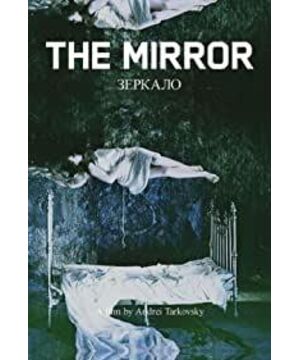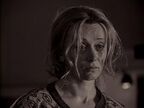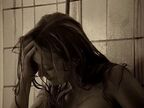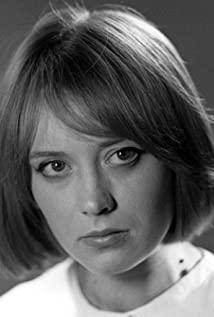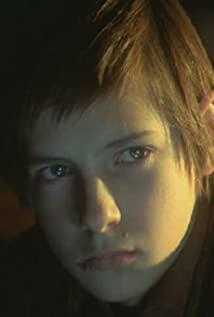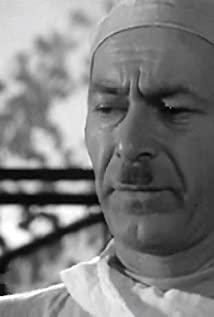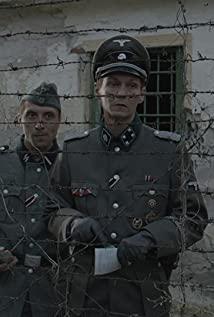How poetic and free this film is! Poetry happens in each shot, but also in the interval between shots. It's the magic of two lenses colliding. Watching the film for the first time felt like a free-roaming experience. I'm not looking for any answers, I'm not trying to understand anything, I'm just quietly watching this Tarkovsky-dominated memory.
I chose to write Andrei Tarkovsky's Mirror because I was fascinated by the film's scene scheduling, especially the lighting, framing, acting, and camera movement.
I would like to start introducing these elements by analyzing a scene from the film. In this scene, the young mother asks her son Alyosha to help her pick up coins from the floor as she is leaving soon. As they picked coins, natural light entered the frame from the right and hit the wooden floor, illuminating the room naturally. A few details also shine quietly - mottled wood floors and walls, red wood mirror frames, and gold and silver reflective surfaces on the back - these subtle colors and textures all bring more interest and content to the scene , giving the scene the quality of a fine oil painting. Then we see the mother coming out of the white door, the camera cuts to a white room, then slowly moves to a close-up of the son; then we see the son walking towards the white door, but we also see that the mother has not left , she turned and said the last words to her son at the door. Then the son closed the door. The transitions between the two scene transitions use similar colors—white doors and white rooms. This approach also works for many other parts of the film, such as the transition from candlelight to lights. These two shots show a very confusing space, as we start to see the mother leaving the door, however the next shot brings us back to the room, from another angle we see her still facing the room, not yet leave. The clip doesn't show how she turns around, and the sudden change from a close-up of her mother to a close-up of her son is baffling. This obscures the position and relationship to the space and the characters, as if they could be anywhere and are always moving. The discontinuity of space and image also blurs time, as Son has said before in this scene, he feels like he has been here before.
then. Alyosha looked into the room and saw a middle-aged woman and an elderly woman in the room. The middle-aged woman asked the older woman to pour Alyosha a cup of tea and read a book to Alyosha. Alyosha then began to read, and was interrupted as she read. He went to open the door, but saw a strange old man. When he returned to the room, the middle-aged woman was no longer there, but the mist of the teacup was still on the table. There is a sense that he will never catch the time, things always happen and end before he knows it. And every time we see Alyosha, his position changes. One time he's next to the bookshelf, the next time we see him, he's behind a portrait, the next time he's outside the room! Because it's a close-up, we can't see the whole space either, and Tarkovsky only lets us see a more abstract, flatter space. Make the audience feel that the space is never ending and time is jumping.
As Alyosha is reading, the camera slowly zooms in on the woman. During this slow zoom-in, the light changes. Dim natural light (like the sun hiding behind clouds), which creates a lowkey lighting. Coupled with the use of dark grey and green tones, the director made the scene look like a Rembrandt oil portrait, full of richness. Before the end of the shot, the camera slowly moved to the right and focused on the tea set on the table. At this point the light changed again, the sun came out of the clouds and illuminated the room, and the moment was like a still life painting in motion.
In other parts of the film, Tarkovsky also uses subtle light changes to create movement and atmosphere. He mainly uses natural light from outside and candlelight or warm light from inside, which creates a very oily texture. Sometimes he controls artificial light to change the light source (position, color, brightness), and sometimes he predicts changes in natural light before shooting. When Tonino Guerra interviewed Tarkovsky in 1978 when he asked Tarkovsky what the idea for his next film was, Tarkovsky said: "I want to shoot a scene by a window or a balcony, a window or a balcony. The glass windows on the top reflect the setting sun. I already know it takes five minutes for the sun to go down. Then I want the characters to speak their lines at sunset so that the light in the windows slowly dims and then goes out. The sun will come in a while, five In minutes it is night” (Tarkovsky, 48).
I was especially impressed by how Tarkovsky used the actors' performances to create new compositions and implicit shot cuts. I've noticed that every time a person turns their head or body back in front of the camera, they cut off the connection to the audience. Therefore, even if the director does not make any cuts, the audience can feel this cut. Tarkovsky uses this a lot in the movies. For example, in one scene, the young mother is talking to her husband about whether she should marry another man, and about their son Alyosha. The camera never caught the husband's face, but kept focusing on the mother. We see the slightest change in her expression, we see her walking around in front of the mirror. The camera follows her, and the composition is always changing, albeit without editing. She walks to the window and the camera zooms in to the window and we see their son watching the fire (and it's raining) outside. Then the camera zooms out and we're back in the room, and we see her stepping back, sitting on the window pane, as if she's stepped back into another world.
(While walking, the light is constantly changing)
The windows and mirrors in this film always represent another space or time. There is a scene that explains this symbol well: the mother and Alyosha go to a woman's place to sell jewelry, and the mother goes to talk to her privately, keeping Alyosha out of the room. There, Ayosha looks at his image in the mirror; the camera slowly zooms in and we see his image in the mirror, getting closer, then cut, and now we look at Alyosha from the mirror's point of view, as if we were in Same as in the mirror. Or... is he looking at himself too? Knowing that the work was about the director's personal childhood memories, he looked at himself with a stronger sense as if he transcended into the space of the film. He communicated with the film's self, and at the moment when the perspective shifted, we felt that the film had pushed the boundaries of reality.
Before Alyosha looks in the mirror, there is a shot. It was two potatoes, the feet of a silverware, and milk spilled on the table. Milk drips down. So beautiful. And the symbol of milk keeps popping up throughout the film. Sometimes it was served in a spherical glass bottle, sometimes it was spilled on the table. It's hard for me to describe in words. Milk is a symbol of childhood and fragility is life. Milk reminds us of the tenderness and love of a mother, because everyone needs breast milk to survive when we are babies. It's important to mammals as well as humans, and there's humanity in milk. Milk also spoils easily, so when we see fresh milk, we feel the moment "alive", we feel the "now". I think that's also the purpose of still life painting at the same time - to express time.
In addition to milk, Tarkovsky included other natural symbols and used them in the scene. The film opens with a shot of grass with the protagonist sitting on a wooden fence overlooking a field. Later there is a shot where the man is standing on the grass looking back at the protagonist, while the wind blows from time to time, blowing the surrounding grass away. In this scene, Tarkovsky uses the movement of the wind to project it onto the grass, creating an atmosphere of sadness and nostalgia. Nature was so important to Tarkovsky that he said he associated it with his mother (Tarkovsky, 45). He expressed his views on the importance of nature in the interview: "We often take nature out of the film because it doesn't seem to be selected. We think we are the real protagonists and we exclude it. But we are not the protagonists, Because we depend on nature. We are the result of its evolution. I think it is a crime to ignore nature from an emotional and artistic point of view. Above all it is stupid because nature always gives us a sense of truth ” (Tarkovsky, 48). Water and fire kept appearing. Tarkovsky sometimes put them in one shot, sometimes separate. There is a scene at the beginning of the film: when it rains, the cabin is on fire, and everyone just quietly watches it burn in the rain. The contrast of water and fire creates a surreal and dreamlike quality because we don't usually feel like they happen at the same time. The sound effects allow viewers to hear both the crisp sound of firewood burning and the sound of dripping water, enhancing the contrast and surreal atmosphere.
Fire may be a symbol of passion and dreams because it is unpredictable and uncapable. It is dangerous, but at the same time it is the fuel necessary for survival.
When water is combined with other objects, it reveals more about the object and gives it a quality of time/recollection because water is always changing, flowing. It implies purification (soul) and therefore innocence and purity. At the end of the film, there is a shot of golden trinkets and broken dishes lying quietly at the bottom of a wooden well. Again, this is like a still life painting. With water, those things suddenly look like fragmented memories of the characters in the film, temporarily set aside and flickering silently in the water
In an interview, Tarkovsky said: "I believe I can be part of this trend of poetic cinema because I don't follow strict narrative development and logical connections. I don't like to make excuses for the actions of the protagonist. One of the reasons I got into film is because I've seen too many films that don't fit the language of the film."
“I believe I could be situated within this tendency of poetic cinema, because I don't follow a strict narrative development and logical connections. I don't like looking for justifications for the protagonist's actions. One of the reasons why I became involved in cinema is because I saw too many films that didn't correspond to what I expected from cinematic language”. ( Tarkovsky, 4)
How poetic and free this film is! Poetry happens in each shot, but also in the interval between shots. It's the magic of two lenses colliding. Watching the film for the first time felt like a free-roaming experience. I'm not looking for any answers, I'm not trying to understand anything, I'm just quietly watching this Tarkovsky-dominated memory.
I think, as Jorge Luis Borges said, the feeling of reading a poem for the first time is the real feeling (Borges, 7). When I first saw the film, some shots suddenly brought me to tears, for example, near the end, the film goes from the young mother overlooking the house to the shot of her aging. The indescribable shock and moving feeling I felt at that moment was perhaps poetry, and it was also what Tarkovsky wanted to achieve with film language.
sources:
Borges, Jorge Luis., and Calin-Andrei Mihalescu. This Craft of Verse. Harvard University Press, 2002.
Tarkovsky, Andrei, and John Gianvito. Andrei Tarkovsky: Interviews. UP of Mississippi, 2006.
View more about Mirror reviews


